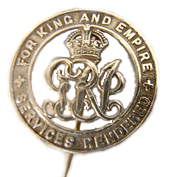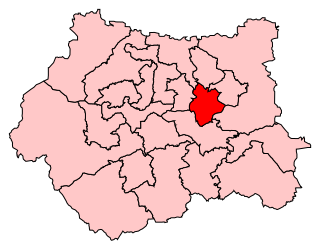The National Association of Discharged Sailors and Soldiers (NADSS) was a British veterans' organisation.
The group was founded in early 1917 at a conference in Blackburn, drawing together various local groups representing working men who had served in World War I but had since been discharged. It campaigned for better pensions, and more opportunities for re-training. Led by James Howell, it developed links with trade unions and the Labour Party. [1]

Blackburn is a town in Lancashire, England, United Kingdom. It lies to the north of the West Pennine Moors on the southern edge of the Ribble Valley, 9 miles (14 km) east of Preston, 20.9 miles (34 km) NNW of Manchester and 9 miles (14 km) north of the Greater Manchester border. Blackburn is bounded to the south by Darwen, with which it forms the unitary authority of Blackburn with Darwen; Blackburn is its administrative centre. At the time of the UK Government's 2001 census, Blackburn had a population of 105,085, whilst the wider borough of Blackburn with Darwen had a population of 140,700. Blackburn had a population of 117,963 in 2011, a massive increase since 2001.

World War I, also known as the First World War or the Great War, was a global war originating in Europe that lasted from 28 July 1914 to 11 November 1918. Contemporaneously described as "the war to end all wars", it led to the mobilisation of more than 70 million military personnel, including 60 million Europeans, making it one of the largest wars in history. It is also one of the deadliest conflicts in history, with an estimated nine million combatants and seven million civilian deaths as a direct result of the war, while resulting genocides and the 1918 influenza pandemic caused another 50 to 100 million deaths worldwide.
A pension is a fund into which a sum of money is added during an employee's employment years, and from which payments are drawn to support the person's retirement from work in the form of periodic payments. A pension may be a "defined benefit plan" where a fixed sum is paid regularly to a person, or a "defined contribution plan" under which a fixed sum is invested and then becomes available at retirement age. Pensions should not be confused with severance pay; the former is usually paid in regular installments for life after retirement, while the latter is typically paid as a fixed amount after involuntary termination of employment prior to retirement.
The association sponsored several candidates at the 1918 general election, forming part of what was termed the "Silver Badge Party". Robert Hewitt Barker was elected in Sowerby, [2] having been endorsed by the local branch, but not by the executive, and acting essentially as an independent Conservative.

The Silver Badge Party was an unofficial political movement which existed in the United Kingdom during and immediately after World War I. The Party consisted of several groups representing the political interests of former service personnel. It took its name from the Silver War Badge (SWB) that was issued to servicemen who had been invalided out of the forces.
Robert Hewitt Barker was a British textile mill owner. He was the independent Member of Parliament for Sowerby, 1918–1922, with the support of the National Association of Discharged Sailors and Soldiers.
Around this time, the group severed its links with the labour movement, and became more conservative in outlook, moving closer to the Comrades of the Great War group. In 1919, James Myles Hogge replaced Howell as President. [3] In 1921, it merged with the Comrades group, the National Federation of Discharged and Demobilized Sailors and Soldiers and the Officers' Association to form the British Legion. [4]
The Comrades of The Great War were formed in 1917 as an association to represent the rights of ex-service men and women who had served or had been discharged from service during World War I. Comrades of The Great War was one of the original four ex-service associations that amalgamated on Sunday 15 May 1921 to form The British Legion.
The National Federation of Discharged and Demobilized Sailors and Soldiers (NFDDSS) was a British veterans organisation.
The Officers' Association (OA) is a British charity supporting military ex-officers and their families, founded in 1920. It received a Royal Charter on 10 June the following year and is closely associated with The Royal British Legion.





